9 options for heating your dacha with electricity: how to create an eternal summer in your home?
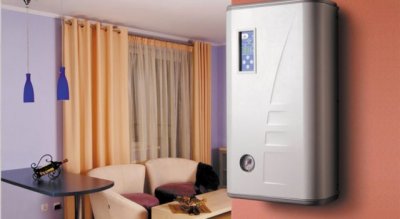
Among all the heating options for a summer house, special attention should be paid to electric heatingModern technologies allow you to warm up quickly and not get dirty with coal.
It is the absence of fuel, which releases dangerous chemicals during combustion, that makes electric heating safe, eliminating the need for chimneys.
Heating system options for a summer house in winter
If your summer cottage conditions allow you to install a powerful electric heater, you should know the basic operating principle each one, as well as advantages and disadvantages.
Electric boiler
The principle of operation of an electric boiler is the process water ionization in the expansion tank from the effect of electric current on it. Thus, the coolant is directly replenished with energy, through the radiator, pipes distributes heat.
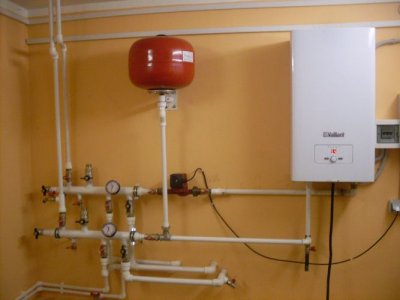
The electric boiler immediately stops working if there is no water supply, excluding explosions and fires.
The installation of the compact device is simple and has light weight. This alternative to boilers does not require separate rooms, special registration or regular cleaning.
Maintenance is simplified by the ability to automate the system. Despite the high efficiency, the unit is completely silent, inexpensive costs.
Among the disadvantages electricity bill may take first place. In this case, you should select a boiler by power according to the dimensions of the room.
Inefficient operation of electric boilers is often associated with water treatment, which cannot be independently determined and brought into compliance. Problems can also arise with liquid circulation, where weak indicators provoke boiling, and too high ones do not start the process.
Important! It is better to use as a coolant water.
The basic configuration of the electrical device includes a heating element, an expansion tank, and devices for controlling the operation of the heat generator.
To install the equipment, it is enough to lay out the pipelines and connect the device to the power grid.
Electric heating element boiler
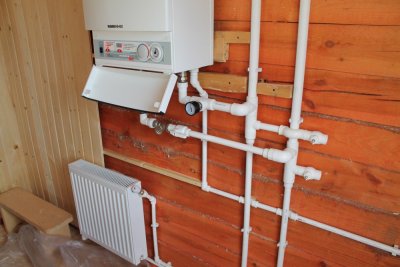
As a heating element in heating element boilers, one or more tubular electric heaters are used, which are mounted in a heat exchanger.
Inside each heating element made of aluminum there is quartz sand insulate the heating element from the tube. This avoids short circuits.
Advantages the boilers are comprised of easy installation, the ability to place the structure on a wall or floor, and adjust the power.
Problems may arise Due to the large size of electrical equipment, any interruptions in power supply will completely disable the heating system.
Electronic heater
The difference between an electric and electronic heater is insignificant. The heating element in the first case is not protected, it transfers its energy to the liquid coolant. And in the case of an electronic device the heating element is closed and transfers its energy to other parts, which in turn, through special blinds, give off heat to the space around.
Pros electrode boilers:
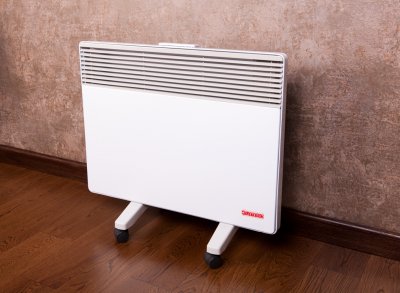
- not complicated design;
- accessible price;
- capacity;
- absence of liquids;
- due to increased efficiency (up to 97%) heat loss is insignificant;
- economy;
- low sensitivity to voltage changes.
Flaws Electrode electric boilers consist of high cost non-freezing coolants, rapid wear of electrodes, decreased electrical conductivity.
Attention! The listed disadvantages include: gas emissions, which may be toxic depending on the composition of the coolant.
The operation of the device becomes more complicated the need for grounding, since there is a risk of electric shock, and careful preparation of the coolant is also required.
Induction boilers
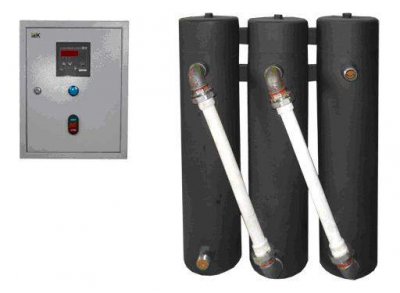
Heating of products made of conductors magnetic field of alternating magnetic field sources called induction heating. A heater based on this operating principle provides hot water and warmth to the home.
Positive aspects such heating consists of economy option, the service life of which can reach three decades. Maintenance is rare.
TO disadvantages heaters of this type are price category, weight.
Infrared heaters
Infrared heaters are universal in terms of their placement. Using special mounting brackets, the device is attached to the ceiling or wall near the network. The main thing here is the height. The device should hang 1-2 meters above the head standing man.
Operating principle These devices are designed to direct the heat released not at the air space, but at solid objects nearby. Thus, furniture and other surfaces around release the heat received into the air without drying it out.
Advantages infrared heaters:
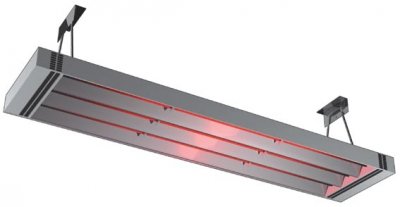
- safety;
- noiselessness;
- absence drying effect on air;
- efficiency;
- low cost;
- Possibility of placement inside the house and outside.
Flaw devices - high price.
Electric fireplaces
Electric fireplaces have a basic operating principle, where electrical energy is converted into heat from a special heated heating elementThe design's special feature is its maximum external similarity to a real fireplace.
Pros alternative modern fireplace:
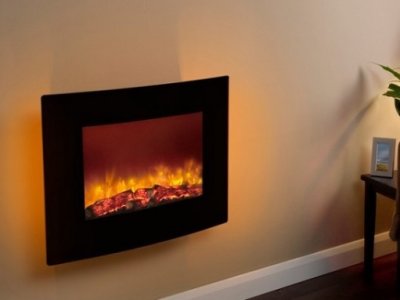
- floor or wall installation;
- low energy consumption;
- fire safety, normal surface temperature in the operating mode, which allows you to touch the fireplace without getting burned;
- decorative designer effects, imitation of coals and smoldering;
- compared to original devices low price.
Cons devices are in the dimensions and weight category of the fireplace, which do not allow the unit to be moved freely. Compared to other electric heaters, the cost of this one is significantly higher.
Convectors
In the convector air flows through tubular heaters in the body. They can use a ceramic heating element that does not burn oxygen. There are openings on top of the heater body that let the warm flow through.
The convector is easy to install and fit into the interior. takes up little space, but when it is gas, it is connected to the outside environment by a pipe. This type of heater is more difficult to install, although it is more economical.
Characteristic Pros of this electrical device:
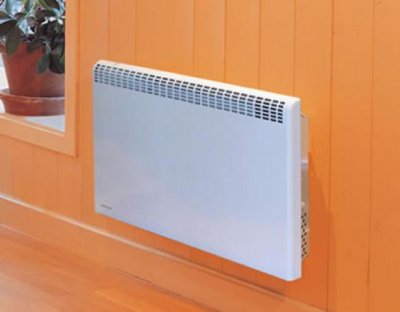
- regulation temperature level;
- automatic shutdown;
- safe touch;
- minimal electricity consumption;
- waterproof frame;
- convenient storage.
Cons device - noise.
Oil devices
Oil heater runs on mineral oil heated to boiling point in flat sections. With the multiplication of sections, the power increases proportionally. The radiator has a thermostat, there are models with a built-in fan for.
You can buy a mobile heater of this type for affordable price. Ease of use and movement using wheels, noiselessness, reliability The unit allows you to conveniently heat large rooms.
The negative side the device is expressed in slow heating process and the lack of possibility of installation in places with high humidity. Without a thermostat, oil devices can reach temperatures at 110 degrees, which causes burns when touched and dries the air.
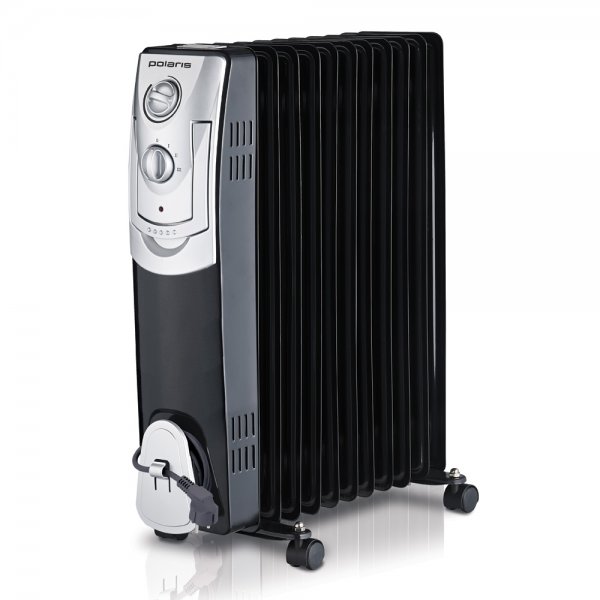
Photo 1. Electric oil-filled radiator Polaris, rated for 1200 W, manufacturer - OOO "Texton Corporation".
Weight and dimensions of the oil-filled heater do not allow it to be lifted and placed freely anywhere.
Fan heaters
Heating element the fan heater is located in a plastic or metal case. There is a fan behind it, which directs air directly at it so that the heated air is distributed throughout the room.
Fan heaters help instant warming up places of small areas.
Simple temperature control using remote control The remote control allows you to turn off the heating mode and use this device as an ordinary fan.
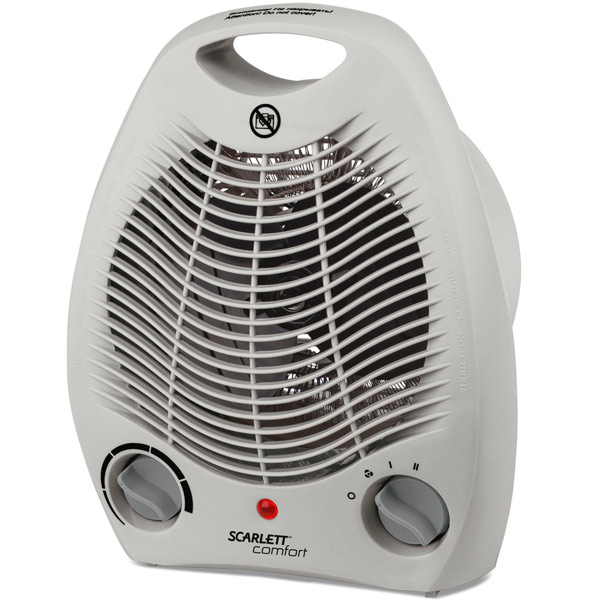
Photo 2. Scarlett fan heater, model FH53002, the device is rated for 2000 W, voltage 220 V.
Compactness The use of separate fan heaters allows the heater to be placed even on a table.
Disadvantage fan heaters are their noise and the need for long-term heating of large spaces.
Useful video
Check out the video, which talks about different options for heating a summer house with electricity and a wood-burning stove.
Should you choose electric heating for your country house?
Electric heating can be a convenient option for heating a summer house. To avoid overpaying electricity bills, you need to choose the type of heating, the power of which will be sufficient for heating the room. Modern technologies allow you to live comfortably in winter. Keep your home warm without harming yourself or nature.








Comments
All this works great as an addition to central heating. I have already had a sad experience, so I recommend not to completely abandon the already installed systems.